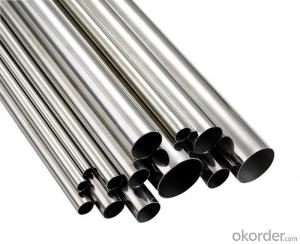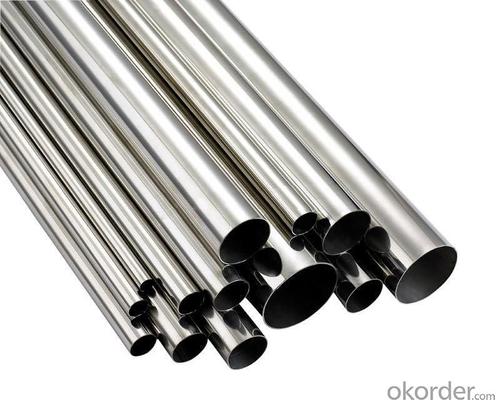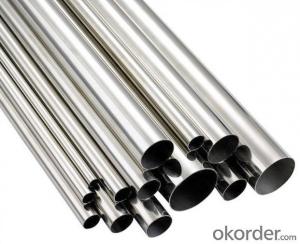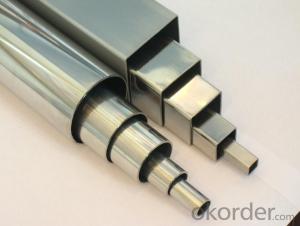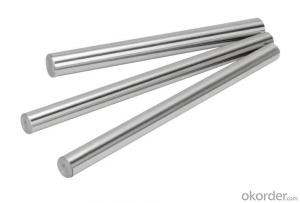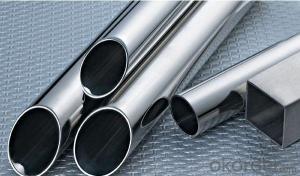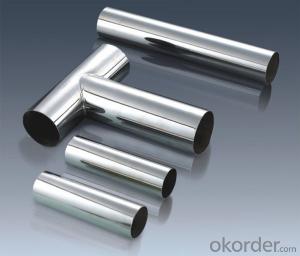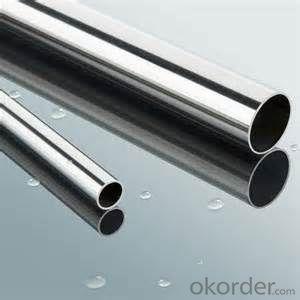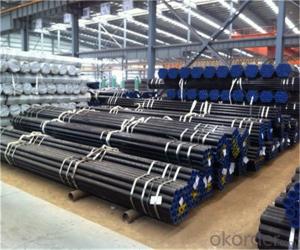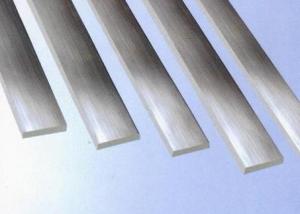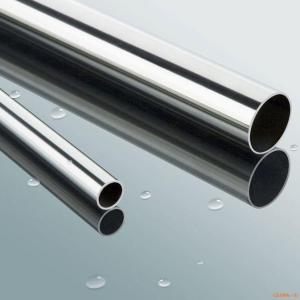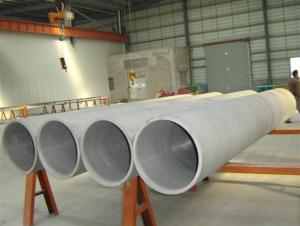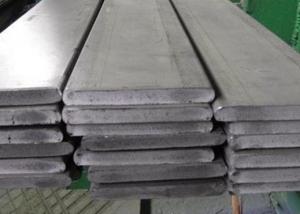Supply Best Quality 304 Stainless Steel Pipe
- Loading Port:
- Tianjin
- Payment Terms:
- TT or LC
- Min Order Qty:
- 25 m.t.
- Supply Capability:
- 10000 m.t./month
OKorder Service Pledge
OKorder Financial Service
You Might Also Like
We are company that have many years experience and professional manager team and engineer team and sales team, sure we will provide you high quality of pipe and professioanl service.
Seamless pipe possesses a hollow section and without seam around the strip steel. It is made with solid bar or steel ingot by perforating machine. As the facture process does not include any welding, seamless pipes are considered to be stronger and more durable. Generally speaking, seamless pipe has better pressure resistance and security than other classifications, and was usually more easily available than welded pipe.
2、Main Features of the Seamless Pipe:
• High working accuracy
• High strength
• Small inertia resistance
• Strong therming dissipine ability
• Good appearance
• Reasonble price
3、Seamless Pipe Specification:
Standard | GB, DIN, ASTM ASTM A106-2006, ASTM A53-2007 |
Grade | 10#-45#, 16Mn 10#, 20#, 45#, 16Mn |
Thickness | 8 - 33 mm |
Section Shape | Round |
Outer Diameter | 133 - 219 mm |
Place of Origin | Shandong, China (Mainland) |
Secondary Or Not | Non-secondary |
Application | Hydraulic Pipe |
Technique | Cold Drawn |
Certification | API |
Surface Treatment | factory state or painted black |
Special Pipe | API Pipe |
Alloy Or Not | Non-alloy |
Length | 5-12M |
Outer Diameter | 21.3-610mm |
Grade | 20#, 45#, Q345, API J55, API K55, API L80, API N80, API P110, A53B |
Standard | ASME, ASTM |
1) Material:20#(ASTM A 106/A53 GRB.API5LGRB,GB),45#,16Mn,10#.
2) Specification range: OD: 21.3-610mm, WT:6-70mm, length:6-12m or according to the requirement of clients.
3) Executive standards: GB, ASME API5L.ASTM A 106/A53,Despite of the above standards, we can also supply seamless steel pipe with standard of DIN, JIS, and so on, and also develop new products according to the requirements of our clients!
4) Surface: black lacquered, varnish coating or galvanized.
5) Ends: Beveled or square cut, plastic capped, painted.
6) Packing: bundles wrapped with strong steel strip, seaworthy packing.
4、Packaging & Delivery:
Packaging Details: | seaworthy package, bundles wrapped with strong steel strip |
Delivery Detail: | 15-30days after received 30%TT |
5、FAQ of Seamless Pipe:
①How is the quality of your products?
We have many years business experience in this area, and we have professional engineer and manager team and sure we can provide you high quality production and professional service.
②How about price?
Yes, we are factory and be able to give you lowest price below market one, and we have a policy that “ for saving time and absolutely honest business attitude, we quote as lowest as possible for any customer, and discount can be given according to quantity”,if you like bargain and factory price is not low enough as you think, just don’t waste your time.Please trust the quotation we would give you, it is professional one.
③Why should you chose us?
We can give you both.Additionally, we can also offer professional products inquiry, products knowledge train(for agents), smooth goods delivery, exellent customer solution proposals.Our service formula: good quality+good price+good service=customer’s trust
SGS test is available, customer inspection before shipping is welcome, third party inspection is no problem.
6、Seamless Pipe Images:
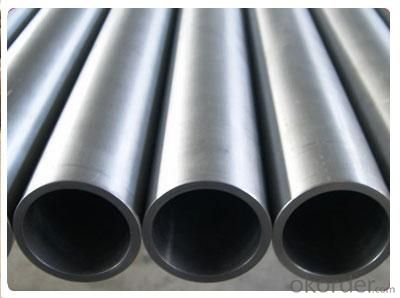
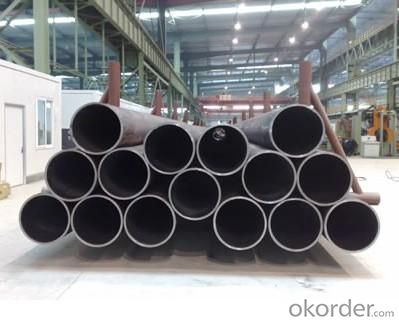
- Q: How do stainless steel pipes compare to polypropylene pipes?
- Stainless steel pipes and polypropylene pipes are two popular choices for various plumbing and industrial applications, and they have distinct characteristics that set them apart. Firstly, stainless steel pipes are known for their exceptional durability and strength. They can withstand high pressure and temperature conditions, making them suitable for applications that require robustness and reliability. On the other hand, polypropylene pipes are not as strong as stainless steel and may not be suitable for high-pressure environments. Secondly, stainless steel pipes have excellent corrosion resistance properties. They are highly resistant to rust, corrosion, and chemical reactions, making them ideal for plumbing systems that handle corrosive fluids or gases. Polypropylene pipes, while resistant to many chemicals, may not have the same level of corrosion resistance as stainless steel pipes. Thirdly, stainless steel pipes offer excellent hygiene and cleanliness. They have a smooth interior surface that discourages the growth of bacteria and biofilm, making them suitable for applications in the food and beverage industry or medical facilities. Polypropylene pipes, while relatively resistant to bacterial growth, may not provide the same level of cleanliness as stainless steel. Additionally, stainless steel pipes are known for their longevity and low maintenance requirements. They have a longer lifespan compared to polypropylene pipes, which may need to be replaced more frequently. Stainless steel pipes also require less maintenance and are less prone to leaks or cracks. However, it is worth noting that polypropylene pipes have their advantages too. They are lightweight, easy to install, and relatively cost-effective compared to stainless steel pipes. Polypropylene also has excellent thermal insulation properties, which can be beneficial in certain applications. Ultimately, the choice between stainless steel pipes and polypropylene pipes depends on the specific requirements of the project. Factors such as pressure, temperature, corrosion resistance, cleanliness, and budget should be considered to determine the most suitable option. Consulting with a professional plumber or engineer can help in making an informed decision.
- Q: Can stainless steel pipes be heat treated?
- Yes, stainless steel pipes can be heat treated. Heat treatment is a process that involves heating the stainless steel pipe to a specific temperature, holding it at that temperature for a certain period of time, and then cooling it down in a controlled manner. This process is typically done to alter the mechanical properties of the stainless steel, such as increasing its hardness or improving its strength. Heat treatment can also be used to relieve stress or remove impurities in the stainless steel pipe. However, it is important to note that not all grades of stainless steel can be heat treated, as the composition of the alloy plays a significant role in its heat treatability. It is recommended to consult the manufacturer or a metallurgical expert to determine the appropriate heat treatment process for a specific stainless steel pipe.
- Q: Can stainless steel pipes be insulated with polyamide?
- Yes, stainless steel pipes can be insulated with polyamide. Polyamide is a type of plastic material that is known for its excellent insulation properties. It can be used as a coating or a lining for stainless steel pipes to provide insulation against heat or cold. The polyamide insulation helps in preventing heat loss or gain, which is essential for maintaining the desired temperature of fluids or gases flowing through the pipes. Additionally, polyamide also offers protection against corrosion and mechanical damage, further enhancing the durability and lifespan of the stainless steel pipes.
- Q: Can stainless steel pipes be insulated with neoprene?
- Yes, stainless steel pipes can be insulated with neoprene. Neoprene is a versatile and durable material known for its excellent insulation properties. It is commonly used to insulate various types of pipes, including stainless steel pipes. Neoprene insulation can effectively reduce heat loss or gain, prevent condensation, and provide protection against extreme temperatures. It is also resistant to moisture, chemicals, and UV radiation, making it suitable for a wide range of applications. When properly installed, neoprene insulation can enhance the energy efficiency and performance of stainless steel pipes.
- Q: Stainless steel welded pipe or seamless pipe expensive?
- Stainless steel is generally divided into three categories: martensitic stainless steel, ferritic stainless steel, austenitic stainless steel, duplex stainless steel and precipitation hardening stainless steel. The price is roughly the same order as stainless steel. But each category has a cheaper and more expensive one, and the difference can be great.
- Q: What is the difference between Type 304L and Type 316L stainless steel pipes?
- Type 304L stainless steel pipes contain a lower carbon content compared to Type 316L stainless steel pipes, resulting in improved corrosion resistance in mildly corrosive environments. On the other hand, Type 316L stainless steel pipes have higher levels of nickel and molybdenum, making them more resistant to corrosion in harsher environments, such as marine or chemical applications.
- Q: Can stainless steel pipes be used for chemical refineries?
- Yes, stainless steel pipes can be used for chemical refineries. Stainless steel is highly resistant to corrosion, making it a suitable choice for handling various chemicals and corrosive substances found in refineries. It offers excellent strength, durability, and resistance to high temperatures, making it ideal for the harsh conditions and demanding environments of chemical refineries. Additionally, stainless steel pipes are easy to clean and maintain, which is crucial in industries where cleanliness is vital to prevent contamination or product quality issues. Overall, stainless steel pipes are widely used in chemical refineries due to their corrosion resistance, strength, and longevity.
- Q: Can stainless steel pipes be used for chemical laboratories?
- Yes, stainless steel pipes can be used for chemical laboratories. Stainless steel is highly resistant to corrosion and chemical reactions, making it suitable for handling a wide range of chemicals and substances commonly used in laboratories. Additionally, stainless steel pipes are known for their strength, durability, and ease of maintenance, making them a reliable choice for laboratory applications.
- Q: How do stainless steel pipes compare to PVC-U pipes?
- Stainless steel pipes have several advantages over PVC-U pipes. Firstly, stainless steel pipes are much stronger and have a higher resistance to impact and pressure, making them suitable for high-pressure applications. PVC-U pipes are more susceptible to cracking or bursting under high pressure. Secondly, stainless steel pipes have a higher temperature resistance than PVC-U pipes. They can withstand much higher temperatures without deforming or losing their structural integrity. PVC-U pipes, on the other hand, have lower temperature limits and can become brittle or soften under extreme heat. Additionally, stainless steel pipes have better corrosion resistance compared to PVC-U pipes. They can withstand exposure to various chemicals, acids, and other corrosive substances without degradation. PVC-U pipes are prone to chemical attack and may deteriorate over time if exposed to certain chemicals. However, it is important to note that stainless steel pipes are generally more expensive than PVC-U pipes, which can be a factor to consider when choosing between the two. Ultimately, the choice between stainless steel pipes and PVC-U pipes depends on the specific requirements of the application and the budget constraints.
- Q: Can stainless steel pipes be used for underground gas lines?
- Indeed, underground gas lines can utilize stainless steel pipes. Renowned for their impressive resistance to corrosion, stainless steel pipes prove to be an apt selection for underground scenarios wherein moisture and diverse chemicals prevalent in the soil pose a threat. Moreover, these pipes exhibit a remarkable strength-to-weight ratio, rendering them sturdy enough to endure the pressure and environmental circumstances linked to underground gas lines. Furthermore, stainless steel pipes boast an extended lifespan and necessitate minimal upkeep, thus emerging as an economical and dependable choice for subterranean gas distribution systems.
Send your message to us
Supply Best Quality 304 Stainless Steel Pipe
- Loading Port:
- Tianjin
- Payment Terms:
- TT or LC
- Min Order Qty:
- 25 m.t.
- Supply Capability:
- 10000 m.t./month
OKorder Service Pledge
OKorder Financial Service
Similar products
Hot products
Hot Searches
Related keywords
